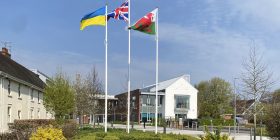Bangor University Begins Research In Virtual Joint Centres With Brazil And China To Improve Nitrogen Use In Agriculture
Agriculture faces a pressing problem: the need to provide food security for a burgeoning population whilst safeguarding the environment. Whilst the use of fertiliser nitrogen has helped in increasing food production, this has been at the expense of the environment, especially in rapidly developing countries such as China and Brazil. There is recognition that food production needs to be more sustainable. For example, the Chinese Government’s current five-year plan has set a stringent target stating that the input of fertiliser will have ‘zero growth’ by 2020. It is therefore crucial that yield increases are achieved with less reliance on, and more efficient use of, chemical inputs.
Up to two-thirds of the nitrogen fertiliser that farmers apply to crops is not taken up by the plants, which causes considerable environmental issues, including soil acidification and the pollution of air and water. To accelerate ways of improving nitrogen fertiliser use efficiency and reduce its environmental impacts, new partnerships between researchers in the UK and China, and the UK and Brazil, have been established in two Virtual Research Centres. The UK-China Centre for Improved Nitrogen Agronomy (CINAg), is led by Rothamsted Research and China Agricultural University, and the UK-Brazil Centre on Integrated Plant-Soil Approaches, NUCLEUS, is led by Nottingham University and Sao Paulo State University. Bangor University is one of several UK collaborators that are involved in both of these Virtual Centres, which are funded by the Newton fund, via by The Biotechnology and Biological Sciences Research Council (BBSRC) and The Natural Environment Research Council (NERC) in the UK.
Bangor University has collaborated with Chinese and Brazilian Research Institutions for many years, e.g. through joint PhD studentships, research projects and members of its School of Environment Natural Resources and Geography staff being appointed as Visiting Professors in some of their research institutions.
The new research programme will explore how nitrogen use efficiency can be improved through use of novel fertiliser products, advanced livestock slurry processing technologies (including anaerobic digestion, slurry separation and slurry acidification), use of innovative soil and plant sensors, and trialling new, more efficient crop and grass varieties. Much of this research will take place at Bangor University’s, Henfaes Research Centre, and the University will received £950,000 over the next three years to support the projects. Ultimately, the researchers will inform Chinese and Brazilian farmers of strategies that deliver sustainable intensification of agriculture through guidance documents and decision support systems.
Professor Dave Chadwick, who leads the Bangor input to the UK-China Centre, said: “Despite the range of farming systems between the different countries, it is clear that we all share the same goal of sustainably improving nitrogen use efficiency. By sharing our collective expertise, methods of working and research facilities we aim to provide the understanding that underpins the more timely delivery of sustainable nitrogen management practices. Moreover, the Centres provide unique opportunities for staff exchange, meaning that we can train the next generation of researchers.”
Launches of the two Virtual Nitrogen Centres have now taken place, in Beijing and Sao Paolo, and Professor Davey Jones, who leads the Bangor input to the UK-Brazil Centre, said: “It was clear from these kick-off meetings that there is already some great research taking place within the individual partner institutions. The Virtual Centres offer a tremendous opportunity to build upon the individual success of different research groups and co-ordinate the international research effort in nitrogen research. We look forward to progressing the research within these Virtual Centres, and combining our knowledge and understanding to develop a range of practical strategies and solutions for enhancing agriculture in China, Brazil and the UK. An important component that the Centres will also address, is how to best communicate information to farmers and their advisors. So we will be exploring the use of Phone Apps and on-line tools to help them make the best decisions when it comes to nutrient management.”
Spotted something? Got a story? Email News@News.Wales










